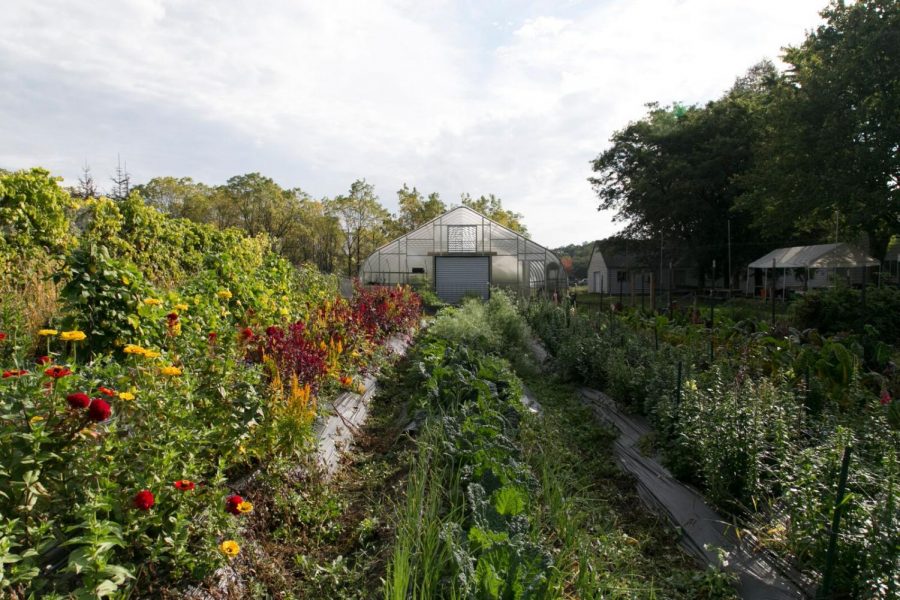The Student Organic Farmers look to what could be
Far from the rest of campus, past the Oakland University R&S Sharf Golf Course, sits chicken coops that used to be used by Oakland’s founder Matilda Dodge Wilson as part of a farm. The chickens have long since been gone and the coops are now used for a variety of things including class labs, faculty research, Meadow Brook Theatre storage and the Student Organic Farm. But, you wouldn’t know that from just driving up.
Though some hoop houses and rows of plants are behind and to the sides of the buildings, there are no signs identifying them with Oakland. The Student Organic Farmers find this frustrating, as it leaves passers by not knowing there are fresh vegetables that are grown by Oakland students.
With the Farm being right off Adams Road, thousands of cars pass it daily. But with no signs, all people see are hoop houses and chicken coops.
Although this lack of signage is frustrating to the Farm, Dean of the College of Arts and Sciences Kevin Corcoran says Oakland has to take some precautions when it comes to having a relationship with the community and business in the area.
“When the campus master plan was done, [the Farm’s] corner of campus had a designation that got a lot of people very worried,” he said. “Those neighbors we have over there are never going to let any commercial property go on that corner… We just continue to sort of do what we can to protect the operation over there.”
Corcoran also says that despite rumors, he has no plans to ever move the Farm to the on-campus Biological Preserve.
“I’m not an expert on organic farming, but for a whole variety of reasons that doesn’t make any sense,” he said. “Moving the Farm is absolutely not something I would push for. I don’t think it’s in the interest of the Farm or the Preserve.”
But even though there is no immediate danger to the Farm having to move or being made smaller, the students who take classes there or are part of the Student Organic Farmers org see so much untapped potential in the space. Just like any other student org, the Farmers can only get so much funding from the Student Activities Funding Board. So, the Farmers have gotten creative with how they raise money to fund their operation.
During the summer and through most of the fall semester, the Farm runs a farm stand in front of Kresge Library where the community can buy fresh produce and snack packs that are cleaned and cut by the Student Organic Farmers. There is also a crop share program where people can pay up front at the beginning of the academic year to receive part of the Farm’s crops each week. This helps the Farm stay afloat financially, but takes a great deal of physical labor.
The Farm used to pay a manager to run the day-to-day operations, but due to budget cuts, that position no longer exists. Corcoran says he didn’t end this position lightly and that there simply wasn’t any money to keep it going. This has left Associate Professor of Biology and faculty adviser of the Student Organic Farmers, Fay Hansen, to do the job alongside two undergraduate students while still doing her faculty job.
Hansen sees great potential that she feels cannot be accomplished without a manager working full time. In July 2014, the Farm drew up a master plan including a compost research area, a teaching pavilion, a perennial garden, office space and more. But for now, that isn’t in the cards.
“What it can be and what it is are two different things,” Hansen said. “I think it’s great now, but it can be so much more.”
Hansen and Corcoran both said funding will continue to be an struggle for the Farm in the foreseeable future, but the university community is what has the power to keep the Farm moving forward.
For instance, the Bear Bus currently does not stop at the Farm even though buses drive past it to Meijer despite requests to do so from the Farm. When requested for an interview regarding the Farm, Graduate Coordinator of Bear Bus Matt Belanger declined.
The Farm is also only as good as the students who volunteer their time there. Having dedicated volunteers and some students on staff is important to Hansen and the Student Organic Farmers.
“Because everything is organically grown, it’s so labor intensive,” said one of the undergraduate managers Katelyn Smoger. “Without our people, we wouldn’t be able to do anything.”











